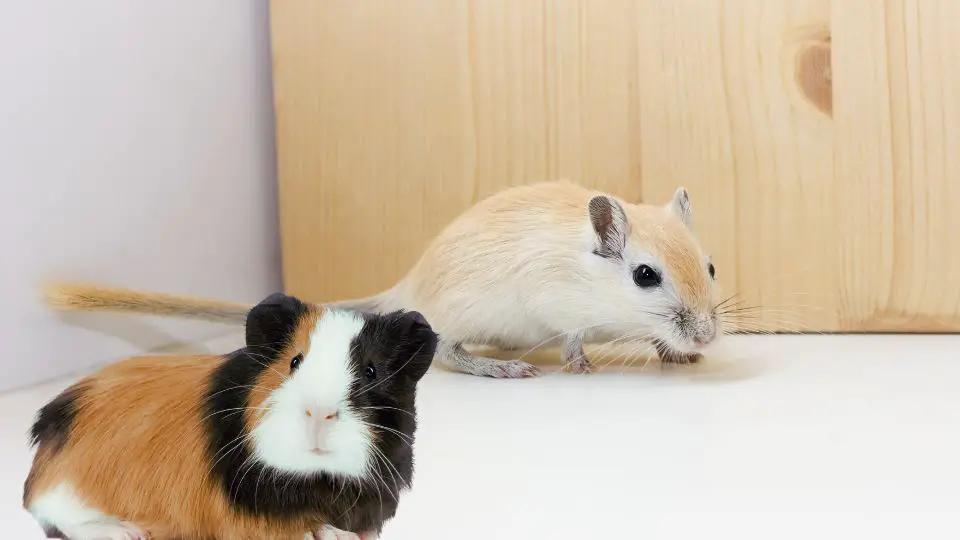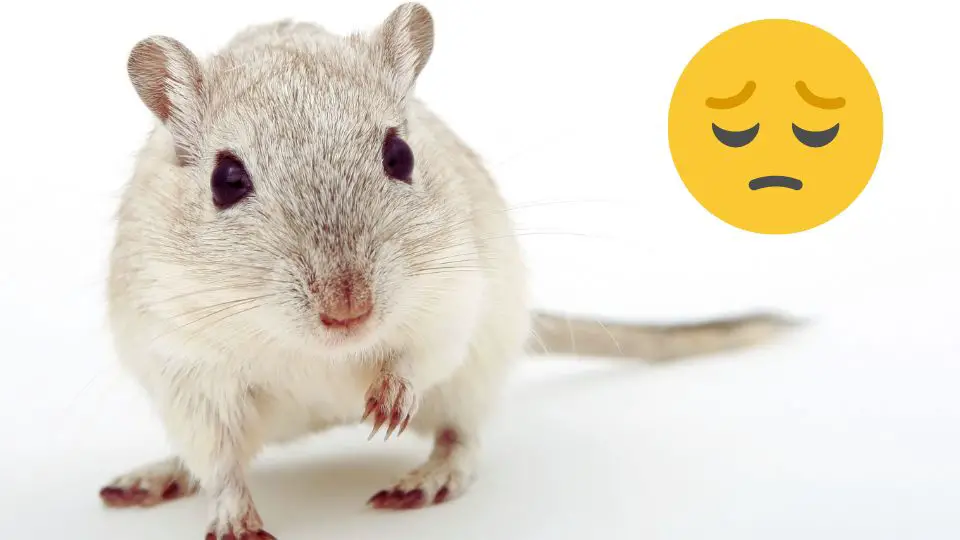Stress can significantly impact the health and behavior of gerbils. Gerbils are sensitive creatures, and various factors can trigger stress in their lives.
Signs of a stressed gerbil may include changes in eating or drinking habits, weight loss or gain, fur loss or excessive grooming, diarrhea or changes in bowel movements, and increased aggression or biting.
By recognizing the signs of stress, we can take the necessary steps to alleviate it and provide a more relaxed and nurturing environment for our gerbil companions.
Physical Signs of Stress
Gerbils, like any other living creatures, can experience stress. It’s important to be aware of the physical signs that may indicate stress in their furry companions. Recognizing these signs can help address the underlying causes and promote the well-being of your gerbil. Here are some common physical signs of stress to look out for:
Changes in Eating or Drinking Habits
One of the first signs of stress in gerbils is a change in their eating or drinking habits. They may start to eat less or show a decreased interest in their food and water. On the other hand, some gerbils may exhibit stress-induced overeating or increased water consumption.
Weight Loss or Gain
Stress can impact a gerbil’s appetite and metabolism, leading to noticeable weight changes. Some gerbils may experience weight loss due to decreased food intake, while others may gain weight as a result of stress-induced overeating.
Fur Loss or Excessive Grooming
Stressed gerbils may engage in excessive grooming behaviors, leading to fur loss and patches of bare skin. They may focus on certain areas of their body, resulting in visible bald spots. Excessive grooming can also lead to skin irritation and sores.
Diarrhea or Changes in Bowel Movements
Stress can affect a gerbil’s digestive system, leading to changes in bowel movements. Diarrhea, soft stools, or constipation may occur as a result of stress-induced gastrointestinal disturbances.
Note that these physical signs can also be indicators of other health issues. Therefore, it’s crucial to monitor your gerbil closely and consult a veterinarian if you notice any concerning changes in their eating, drinking, weight, fur condition, or bowel movements.
Behavioral Signs of Stress
Increased Aggression or Biting
Stress can cause gerbils to become more aggressive or exhibit biting behavior. They may show signs of irritation, become territorial, or display aggression towards other gerbils or even their owners. If your gerbil starts biting or acting aggressively, it could be a sign of stress.
Excessive Chewing or Digging
Stressed gerbils may engage in excessive chewing or digging behaviors. They may chew on cage bars, toys, or other objects more frequently than usual. Excessive digging may result in the destruction of bedding or the creation of elaborate burrows. These behaviors can be a way for gerbils to release their stress and pent-up energy.
Hiding or Excessive Sleep
Gerbils that are experiencing stress may spend more time hiding in their nest or burrow. They may become less active and show a reluctance to interact with their surroundings or their owners. Additionally, stressed gerbils may sleep more than usual as a way to escape from stressful situations.
Restlessness or Pacing
Restlessness and pacing are common behavioral signs of stress in gerbils. They may constantly move around their enclosure, repeatedly run back and forth, or appear agitated. This restless behavior can indicate that your gerbil is feeling anxious or stressed.
Environmental Triggers of Stress
Loud Noises or Sudden Changes in the Environment
Gerbils have sensitive hearing, and loud noises can startle and stress them. Sudden loud sounds, such as slamming doors, loud music, or barking dogs, can make them feel anxious or threatened. It’s important to provide a calm and quiet environment for your gerbil to minimize the impact of loud noises.
Inadequate or Crowded Living Conditions
Gerbils require enough space to move, play, and establish territories. Overcrowded enclosures can lead to increased stress levels, as gerbils may feel confined and unable to retreat to their preferred areas. Providing a spacious enclosure with appropriate bedding, hiding spots, and exercise opportunities can help reduce stress associated with crowded living conditions.
Lack of Mental or Physical Stimulation
Gerbils are active and curious creatures that need mental and physical stimulation to stay healthy and happy. Boredom and lack of stimulation can lead to stress. It’s important to provide a variety of toys, tunnels, and objects for exploration, as well as opportunities for exercise and playtime outside of the enclosure. Regular environmental enrichment can help alleviate stress and promote overall well-being.
Presence of Predators or Perceived Threats
Gerbils have a natural instinct to be wary of potential predators. Even though they are kept as pets in a safe environment, the presence of other animals or perceived threats can trigger stress responses. Make sure to keep your gerbil’s enclosure away from predatory animals and ensure they feel secure in their surroundings.
Observing Changes in Social Interactions
Changes in social interactions can be an indicator of underlying issues or stress in gerbils. You should observe and understand these changes to ensure the well-being of your gerbil companions. Here are some key aspects to consider when observing changes in social interactions:
Increased or Decreased Social Interactions
Pay attention to any notable changes in the frequency or intensity of social interactions among your gerbils. An increase in social interactions, such as grooming, playing, and vocalizing, may indicate a positive and harmonious social dynamic. On the other hand, a decrease in social interactions or the avoidance of social contact may be a sign of stress, illness, or conflict within the group.
Aggression Towards Cage Mates
Gerbils establish a social hierarchy, and occasional squabbles or displays of dominance are normal. However, if you notice an escalation in aggressive behaviors, such as biting, chasing, or excessive fighting, it may indicate tension or territorial disputes among your gerbils. It’s important to intervene and separate gerbils if the aggression becomes excessive or results in injuries.
Avoidance or Withdrawal from Social Interactions
Gerbils typically enjoy socializing and engaging with their cage mates. If you observe a gerbil consistently avoiding or withdrawing from social interactions that were previously enjoyed, it may be a sign of stress, fear, or discomfort.
In our experience, this can be caused by various factors, such as illness, bullying, or a change in the social dynamics. Providing a safe and peaceful environment, as well as closely monitoring the gerbil’s behavior, can help address these issues.
Ways to Reduce Stress
Stress can negatively impact the well-being and health of gerbils. Here are some effective ways to reduce stress in gerbils, that we observed are working:
Provide a Suitable and Enriched Environment
Gerbils thrive in an environment that meets their natural instincts and provides ample opportunities for mental and physical stimulation. Ensure your gerbil’s enclosure is spacious, well-ventilated, and equipped with appropriate bedding, toys, tunnels, and hiding spots. These enrichments allow gerbils to engage in natural behaviors, such as burrowing, exploring, and playing, which can help alleviate stress.
Maintain a Consistent Routine
Gerbils are creatures of habit and appreciate a structured and predictable routine. Establish a consistent schedule for feeding, cleaning, and handling your gerbils. Maintaining a regular routine helps gerbils feel secure and reduces the uncertainty that can contribute to stress.
Offer Appropriate Social Interactions
Gerbils are social animals and benefit from appropriate social interactions and companionship. Ensure that your gerbils have compatible cage mates to engage in social behaviors, grooming, and play. However, be mindful of any conflicts or aggression that may arise and provide separate spaces if necessary. Regular social interactions with you, their owner, can also help reduce stress and strengthen the bond between you and your gerbil.
Minimize Exposure to Potential Stressors
Identify and minimize potential stressors in your gerbil’s environment. These may include loud noises, sudden temperature changes, drafts, bright lights, or the presence of predators. Place your gerbil’s enclosure in a quiet and low-traffic area of your home, away from household appliances or disturbances. Be mindful of other pets or young children that may cause stress to your gerbils.
Conclusion
In conclusion, being able to identify signs of stress in your gerbil is crucial for their overall well-being. Stress can affect gerbils both physically and emotionally, impacting their health and behavior.
By observing changes in eating habits, behavior, social interactions, and physical appearance, you can determine if your gerbil is experiencing stress. It is essential to address the underlying causes and make appropriate changes to their environment and routine to help reduce stress and promote a happier and healthier life for your gerbil.







